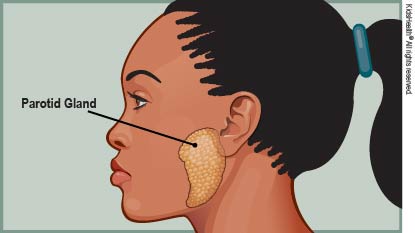Parotitis: How to Care for Your Child
Parotitis (pair-oh-TY-tiss) happens when the parotid gland gets inflamed (swollen and irritated) or infected by a virus or bacteria. Kids with parotitis often have pain, redness, and swelling on the lower side of the face. They also may have a fever and painful swallowing. Parotitis can happen on one or both sides of the face. You can help your child feel more comfortable while recovering from parotitis.


-
If bacteria caused the parotitis, give your child all the doses of antibiotics that the health care provider prescribed, even if your child is feeling better. This is the best way to kill the bacteria.
-
Massage the parotid gland the way the health care provider showed you.
-
To help the flow of saliva (spit), if your child is over 5 years old, give chewing gum or sour hard candy if recommended. If your child is under 5 years old, don't give gum or hard candy because these are choking hazards.
-
You can give medicine for pain if your health care provider says it's OK. Use these medicines exactly as directed:
-
acetaminophen (such as Tylenol® or a store brand)
-
OR
-
ibuprofen (such as Advil®, Motrin®, or a store brand). Don't give to babies under 6 months old.
-
Don't give aspirin to your child or teen as it is linked to a rare but serious illness called Reye syndrome.
-
If it is soothing to your child, put warm or cool compresses over the swollen cheek.
-
Encourage your child to drink lots of liquids and rest as needed.
-
If chewing is so painful that it's hard for your child to eat solids, try serving liquids and soft food.

Your child:
-
has new or worsening redness or swelling of the face or neck
-
seems to be getting sicker
-
can't move the face normally
-
isn't eating or drinking
-
appears dehydrated; signs include dizziness, drowsiness, a dry or sticky mouth, sunken eyes, crying with few or no tears, or peeing less often (or having fewer wet diapers)

Is testing needed to diagnose parotitis? Testing usually isn't needed to diagnose parotitis. Sometimes an imaging study (ultrasound, CT scan, or MRI) is done to look closely at the parotid gland.
What is the treatment for parotitis? Treatment for parotitis depends on what caused it. Your child's treatment may include:
-
massaging the parotid gland
-
putting a warm or cool cloth over the area of the parotid gland
-
chewing gum and sucking on sour hard candy to help the flow of saliva (spit)
-
antibiotics if the infection is caused by bacteria
Can parotitis be prevented? Yes, sometimes it can be prevented. The MMR (measles, mumps, rubella) vaccine can help prevent parotitis caused by the mumps virus. Be sure that all family members have gotten their recommended vaccines.